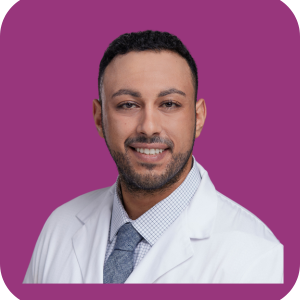2025Technology, Telehealth and Informatics Committee Leader Spotlight
Sidra Speaker, MD, MS, Chair of the EMRA Technology, Telehealth & Informatics Committee, 2025
 Program: UC San Diego Health
Program: UC San Diego Health
Your goal as an EMRA leader: To help make informatics education accessible to emergency medicine residents throughout the country so that we're prepared to use the technology available to us. I would like to promote physician understanding of data and technology so that we can best harness these tools to improve the cost, quality and accessibility of Emergency care.
Why get involved in a professional society? To connect with other residents and faculty within my field and to get involved the the EM community.
What do you think are the top three traits of a great leader? Drive, creativity, and excellent communication skills.
What is the best advice you have ever received? Don't change you goals just because someone says "no".
What is something that people don't know about you? I relax by doing art projects and making birthday cards for close friends and family.
If you weren't an emergency physician, what would you be? A pain medicine physician. If not a physician I'd like to be a florist.
What is the last non-textbook you read? The Amber Spyglass
Monique Arnold, MD, Chair-Elect of the EMRA Technology, Telehealth & Informatics Committee, 2025
 Program: Icahn School of Medicine at Mount Sinai
Program: Icahn School of Medicine at Mount Sinai
Avi Patel, MD, Vice Chair of the EMRA Technology, Telehealth & Informatics Committee, 2025
 Program: UC San Diego Health
Program: UC San Diego Health
Your goal as an EMRA leader: As an EMRA leader, I aim to advocate for innovations that enhance physician and patient care by leveraging technology and informatics. I want to ensure emergency medicine clinicians are prepared to harness data and emerging tools to improve the cost, quality, and accessibility of care.
If I weren't an emergency physician, I would be: A National Park Service Ranger. Or Astronaut.
Alec LaBadie, MD, Vice Chair of the EMRA Technology, Telehealth & Informatics Committee, 2025
 Program: Henry Ford Wyandotte
Program: Henry Ford Wyandotte
Your goal as an EMRA leader: My goal as an EMRA leader is to bring new ideas of a new generation to the field of medicine. I also hope to participate in influencing legislative decision making on behalf of physicians and patients.
If I weren't an emergency physician, I would be: I would probably work in some computer science field with coding or engineering.
Favorite channel on social media? TheBurntPeanut
Christopher Awad MD,MBA, Assitant Vice Chair of the EMRA Technology, Telehealth & Informatics Committee, 2025
 Program: The Ohio State University Wexner Medical Center
Program: The Ohio State University Wexner Medical Center
Your goal as an EMRA leader: As an EMRA leader, my goal is simple but ambitious: to be a catalyst. I want to help create spaces where fresh ideas are welcomed, mentorship feels personal, and every member feels like their voice shapes the future of emergency medicine. I hope to amplify the energy, grit, and creativity that drew all of us to this field in the first place—and to turn that passion into tangible action. Whether it's building bridges between national initiatives and individual residents or helping young leaders find the confidence to take their first big step, my mission is to leave EMRA—and our specialty—better, braver, and bolder than I found it.
What do you think are the top three traits of a great leader? Vision with Humility: A great leader knows where they're going—but never forgets that the best ideas are a team effort. Relentless Curiosity: Great leaders ask better questions before rushing to provide answers. They stay open, adaptive, and eager to learn alongside their teams. Empathy in Action: Leadership is about more than understanding—it’s about showing up. The best leaders lead by listening, advocating, and uplifting those they serve, even (and especially) when it’s hard.
If I weren't an emergency physician, I would be: If I weren’t an emergency physician, I would be a mycologist. There’s something fascinating about the hidden world of fungi—their quiet complexity, their essential role in ecosystems, and their ability to break down, rebuild, and sustain life in ways we’re only beginning to understand. In another life, I imagine myself trekking through forests, with an Amadou hat on (hat made from mushrooms—look it up!) identifying new species, and uncovering the ways mycology intersects with medicine, ecology, and even technology.
Favorite channel on social media? My favorite social media channel is Mark Rober’s YouTube channel. Don't judge me (ok a little) He's dope: He has this brilliant way of making science, engineering, and curiosity feel personal and important. Whether he’s building squirrel-proof obstacle courses or using creativity to solve real-world problems I never cared about until that moment, his content is a reminder that innovation is fueled by playfulness and perseverance.
Related Content






